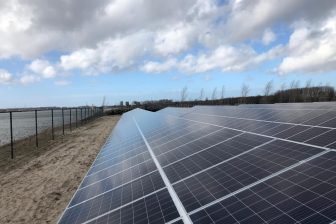COP21 – ‘Klimaatverandering raakt economie harder dan gedacht’
30 oktober 2015 – Klimaatverandering zal de economie harder raken dan eerst werd gedacht. Zelfs rijke landen krijgen het rond 2100 hard te verduren. Dat concluderen onderzoekers in het blad Nature.
Nature: ‘The first evidence that economic activity in all regions is coupled to the global climate and establish a new empirical foundation for modelling economic loss in response to climate change, with important implications.’
De onderzoekers zijn Marshall Burke, Solomon M. Hsiang en Edward Miguel.
Uit een bericht van Scientias over het onderzoek
‘(…) [De onderzoekers] baseren zich onder meer op de gegevens van 166 landen. Die gegevens besloegen een periode van vijftig jaar (1960 tot 2010). De onderzoekers keken naar de totale waarde van alle goederen en diensten die binnen de economie van deze landen werd geproduceerd (oftewel het bruto binnenlands product). Vervolgens keken ze wat er met die waarde gebeurde in jaren waarin het ongebruikelijk warm of ongebruikelijk koud was.
Uit het onderzoek blijkt dat hogere temperaturen in eerste instantie goed zijn voor een economie. (…) Maar zodra de gemiddelde jaarlijks temperatuur hoger uitvalt dan 55 graden Fahrenheit (12,7 graden Celsius) zien rijke landen hun bruto binnenlands product teruglopen. (…) Als er niets aan het veranderende klimaat wordt gedaan, zal het inkomen per hoofd tegen het jaar 2100 in 77 procent van de landen wereldwijd lager zijn dan nu. Het inkomen van mensen wereldwijd kan tegen 2100 wel eens 23 procent lager uitvallen dan in een wereld waarin klimaatverandering geen rol speelt.
Het onderzoek veegt ook een veelgehoorde aanname van tafel. Die aanname stelt dat rijke landen minder hard getroffen worden door het veranderende klimaat, omdat ze hun geld en technologie kunnen gebruiken om zich aan de veranderende temperaturen aan te passen. Het onderzoek laat echter zien dat rijke landen in het verleden niet anders op veranderingen in temperatuur reageerden dan armere landen. (…)’
Uit het bericht in Nature over het onderzoek
‘(…) Growing evidence demonstrates that climatic conditions can have a profound impact on the functioning of modern human societies, but effects on economic activity appear inconsistent. Fundamental productive elements of modern economies, such as workers and crops, exhibit highly non-linear responses to local temperature even in wealthy countries. In contrast, aggregate macroeconomic productivity of entire wealthy countries is reported not to respond to temperature, while poor countries respond only linearly. Resolving this conflict between micro and macro observations is critical to understanding the role of wealth in coupled human–natural systems and to anticipating the global impact of climate change. Here we unify these seemingly contradictory results by accounting for non-linearity at the macro scale. We show that overall economic productivity is non-linear in temperature for all countries, with productivity peaking at an annual average temperature of 13 °C and declining strongly at higher temperatures. The relationship is globally generalizable, unchanged since 1960, and apparent for agricultural and non-agricultural activity in both rich and poor countries. These results provide the first evidence that economic activity in all regions is coupled to the global climate and establish a new empirical foundation for modelling economic loss in response to climate change, with important implications. If future adaptation mimics past adaptation, unmitigated warming is expected to reshape the global economy by reducing average global incomes roughly 23% by 2100 and widening global income inequality, relative to scenarios without climate change. In contrast to prior estimates, expected global losses are approximately linear in global mean temperature, with median losses many times larger than leading models indicate. (…)’
Marshall Burke is verbonden aan het Department of Earth System Science, Stanford University, California.
Solomon M. Hsiang is verbonden aan de Goldman School of Public Policy, University of California, Berkeley, California.
Edward Miguel is verbonden aan het Department of Economics, University of California, Berkeley, California.
Marshall Burke heeft een blog waarop hij de critici rond het onderzoek antwoord geeft.
Colors are 2100 temperatures under “business as usual” climate change (left, RCP8.5) and aggressive climate policy (right, RCP2.6). Burke, Hsiang, & Miguel (Nature 2015) demonstrate the effects of these changes on economies around the world. These findings are used in a simulation of future nightlights, as seen from space, since richer economies tend to glow brighter. A hotter world is a more unequal world, with the north benefitting and tropical economies declining. A cooler world leads to more equitable global growth, offering regions like Africa the chance to “catch up”. Figure attribution: Burke, Hsiang, & Miguel (Nature, 2015)
RCP = Representative Concentration Pathways (greenhouse gas emissions scenarios)
Bronnen
Scientias, 28 oktober 2015: Klimaatverandering raakt economie harder dan gedacht
Nature, onderzoeksverslag, 21 oktober 2015: Global non-linear effect of temperature on economic production (pdf, kosten € 30)
Blog Marshall Burke: Climate change and the global economy
Op een eigen website publiceren de auteurs hun onderzoek zelf ook (vrij toegankelijk)



